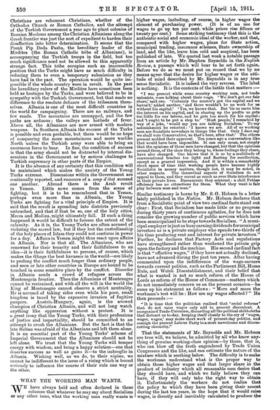Christians are vehement Christians, whether of the Orthodox Church or
Roman Catholics, and the attempt of the Turkish Government a year ago to plant colonies of Bosnian Moslems among the Christian Albanians along the Greek frontier was just the sort of expedient to harden their disaffection into bitter determination. It seems that the Prenk Pip Doda Pasha, the hereditary leader of the Mirdites (the Roman Catholic tribe of Albanians), is accompanying the Turkish troops in the field, but too much significance need not be allowed to this apparently strange fact. This tribe occupies such an inaccessible position that the Turks might have as much difficulty in reducing them to even a temporary submission as they have had in the past. The operation would be quite im- possible if the whole country were in revolt. In the past the hereditary rulers of the Mirdites have sometimes been held as hostages by the Turks, and were believed to be in sympathy with the Turkish Government, but that made no difference to the resolute defiance of the tribesmen them- selves. Albania is one of the most difficult countries in the world for campaigning. There are no railways, and few roads. The mountains are unmapped, and the few paths are arduous ; the valleys are hotbeds of fever. Above all, the Albanians are now armed with modern weapons. In Southern Albania the success of the Turks is possible and even probable, but there would be no hope of conquering the more mountainous and more warlike North unless the Turkish army were able to bring an enormous force to bear. In fine, the condition of success is that the army should not be distracted by internal dis- sensions in the Government or by serious challenges to Turkish supremacy in other parts of the Empire. It is the absence of any certainty that this condition will be maintained which makes the anxiety of the Young Turks extreme. Dissensions within the Government are continually reported, and rumours of a coup d'etat succeed one another. Abroad there is the Arab revolt in Yemen. Little news comes from the scene of fighting, but it is to be remembered that in Yemen, perhaps even more than in Albania, the Young Turks are fighting for a vital principle of Empire. It is said that the revolt is spreading into districts previously untouched, and that if that be so, one of the holy cities, Mecca and Medina, might ultimately fall. If such a thing happened it would be difficult to foresee the extent of the calamity. As it is, the Young Turks are often accused of violating the sacred law, but if they lost the custodianship of the holy places of Islam they could not continue in power for a day. Affairs in Yemen might thus react upon affairs in Albania. Nor is that all. The Albanians, who are renowned for their tenacity and their faithfulness to an idea—it is their faithfulness to persons, of course, which makes the Ghegs the best kavasses in the world—are likely to prolong the conflict much longer than ordinary people, and soon or late other countries in Europe are bound to be touched in some sensitive place by the conflict. Disorder in Albania sends a crowd of refugees across the Montenegrin frontier. Then the Albanians of Montenegro cannot be restrained, and with all the will in the world the King of Montenegro cannot observe a strict neutrality. He is accused of taking sides even while his poor, small kingdom is taxed by the expensive invasion of fugitive paupers. Austria-Hungary, again, is the avowed champion of Christian Albania, and will not long watch anything like oppression without a protest. It is a great irony that the Young Turks, with their professions of justice and impartiality, should be committed to an attempt to crush the Albanians. But the fact is that the late Sultan was afraid of the Albanians and left them alone. It is an essential part of the Young Turks' scheme of Imperial Government that the Albanians should not be left alone. We trust that the Young Turks will temper energy with wisdom, and bring a happy solution—one that deserves success as well as gains it—to the imbroglio in Albania. Wishing well, as we do, to their regime, we cannot be indifferent to the issue of a rising which is bound seriously to influence the course of their rule one way or the other.




































 Previous page
Previous page